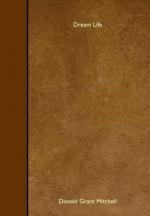You however come very little under his control; you enter upon the proud life, in the small boy’s department, under the dominion of the English master. He is a different personage from Dr. Bidlow: he is a dapper little man, who twinkles his eye in a peculiar fashion, and who has a way of marching about the schoolroom with his hands crossed behind him, giving a playful flirt to his coat-tails. He wears a pen tucked behind his ear; his hair is carefully set up at the sides and upon the top, to conceal (as you think later in life) his diminutive height; and he steps very springily around behind the benches, glancing now and then at the books,—cautioning one scholar about his dog’s-ears, and startling another from a doze by a very loud and odious snap of his forefinger upon the boy’s head.
At other times he sticks a hand in the armlet of his waistcoat; he brandishes in the other a thickish bit of smooth cherry-wood, sometimes dressing his hair withal; and again giving his head a slight scratch behind the ear, while he takes occasion at the same time for an oblique glance at a fat boy in the corner, who is reaching down from his seat after a little paper pellet that has just been discharged at him from some unknown quarter. The master steals very cautiously and quickly to the rear of the stooping boy, dreadfully exposed by his unfortunate position, and inflicts a stinging blow. A weak-eyed little scholar on the next bench ventures a modest titter, at which the assistant makes a significant motion with his ruler,—on the seat, as it were, of an imaginary pair of pantaloons,—which renders the weak-eyed boy on a sudden very insensible to the recent joke.
You meantime profess to be very much engrossed with your grammar—turned upside-down; you think it must have hurt, and are only sorry that it did not happen to a tall, dark-faced boy, who cheated you in a swop of jackknives. You innocently think that he must be a very bad boy, and fancy—aided by a suggestion of the old nurse at home on the same point—that he will one day come to the gallows.
There is a platform on one side of the schoolroom, where the teacher sits at a little red table; and they have a tradition among the boys, that a pin properly bent was one day put into the chair of the English master, and that he did not wear his hand in the armlet of his waistcoat for two whole days thereafter. Yet his air of dignity seems proper enough in a man of such erudition, and such grasp of imagination, as he must possess. For he can quote poetry,—some of the big scholars have heard him do it; he can parse the whole of “Paradise Lost,” and he can cipher in Long Division, and the Rule of Three, as if it was all Simple Addition; and then, such a hand as he writes, and such a superb capital B! It is hard to understand how he does it.
Sometimes lifting the lid of your desk, where you pretend to be very busy with your papers, you steal the reading of some brief passage of “Lazy Lawrence,” or of the “Hungarian Brothers,” and muse about it for hours afterward to the great detriment of your ciphering; or, deeply lost in the story of the “Scottish Chiefs,” you fall to comparing such villains as Menteith with the stout boys who tease you; and you only wish they could come within reach of the fierce Kirkpatrick’s claymore.




